- Home
- Keneally, Thomas
Homebush Boy Page 3
Homebush Boy Read online
Page 3
For the first four years of his high school, he had had for his guide a loud, eccentric, hectically generous boy called Martin Dahdah, who came from a Lebanese family. It seemed that nearly everyone in Australia up to the end of the Second World War had names which came from the British Isles, but there was a Lebanese draper or haberdasher in every town, and one family of Greeks, and one of Italians.
The year before, turbulent Dahdah had astonished everyone by going off to the minor seminary in Springwood in the Blue Mountains to do his Leaving Certificate and then begin studying for the priesthood, and so Matt didn’t have a study companion any more. I wanted to be associated with Matt, who shone like alabaster and who appealed to some streak of what may have been both kindliness and passion for spacious gestures in me.
How to be fair to the sixteen-year-old Celestial and GMH lover who took over from Dahdah the Arab? Amongst my other motives, noble and base, was athletic ambition too, which always ran high in me. I had seen Dahdah running with Matt on St Pat’s oval, Matt with his head on his side as he followed the rattling of Braille type-pieces which Dahdah carried in a Nugget Boot Polish tin in his right hand. I was faster than Dahdah, and I thought of using two boot polish cans full of Braille pieces – twice the noise for Matt to follow. I could tell that Matt was a fast man too, a natural sportsman. We would do well together. If we practised enough, Matt would be able to run the bends of the oval at full pace. The fact that this athletic endeavour would be seen by Bernadette Curran gave it greater, not lesser worth.
Anyhow, in the January of 1952, with the glow of his vocation on his forehead, Dahdah had come to my place and asked me to be Matt’s companion. We may have used the callow term ‘take over Matt’.
I accepted the task up front and then tried to reconcile my parents to it. Other boys were more wary about taking Matt on as a study companion. This was, after all, the Leaving Certificate year, and university scholarships lay at the end, and it was hard enough to drag yourself through the process without also – this was the way many saw it – dragging someone else through as well.
The decision to become Matt’s companion worried my parents too. Again, the sacrifices they made so that my brother and I could go to the Brothers, whose record with university scholarships stood so high, seemed imperilled. My father went without drink. My mother, who was by everyone’s account a beautiful woman, had to line her holed shoes with newspaper. They gave up fashion and exuberance and social events, entertaining and being entertained, in the hope my brother and I would become doctors or lawyers. And I was close to being their first success. A minor academic star.
They were concerned about all the extraneous work I would have to do with the admired Matt. For example, he did Ancient History and I didn’t. Yet I would need to read the Ancient History texts to him by the hour.
They were also probably more aware than I was that Matt was no neutral quantity, but a robust soul in his own right. That disease which turned Matt milk-white in his mother’s womb and left him without any of the mechanisms of sight, would all his life threaten to make him appear less of a person, and like most blind people he would fight that belittling impulse in others, and only in the end come to a sort of truce with it.
Matt, who could have been anything if not for that untoward case of measles! In coming to St Pat’s and studying amongst the sighted, he may have been a pioneer, but the sentimentality and ignorance of the age cast him as a curiosity and a freak. The Daily Mirror came and took a picture of Matt amongst the sighted boys, sitting at his desk, punching away at the Braille typewriter, a machine in which he rolled heavy pages of brown-grey paper. He punched keys with Braille characters on them, and indentations matching the keys appeared on the pages, so he could read what Brothers Adams or Harding or Markwell had said.
Few observers mentioned the armies of blind children for whom Matt stood. Few asked what was being done for them. They were safe in their institutions. They were securely enclosed at St Lucy’s, named after a blind saint who’d found the light.
I was of course too young, too crass, too innocent not to be part of the general view that Matt was in part a hero and in part a freak. But if you were his friend, he proved to you daily that he was no more or no less than another boy. I slowly came to perceive too his parents’ courage in letting him go forth amongst us ordinary Western Suburbs boys.
But they had family traditions of bravery. They came from South Coast farming families. Mr Tierney was an older man and had served in World War I. One of the fixtures in his living room was Bean’s History of Australia in the War of 1914–18. He would sometimes point out the picture of the Cathedral of Albert in Flanders. Either the Germans or the British – I forget which – had put a charge in the spire and set it off, so that the Virgin who stood on top should no longer act as an aiming marker. The Virgin, therefore, leaned down at a crazy angle, reaching her infant towards the passing troops, perhaps inviting their mercy. I supposed that’s what the Tierneys were doing. Lowering their child in the direction of the rough soldiery of St Pat’s.
Mr Tierney told me one day while I was waiting for Matt and filling in time by looking at the photographs in Bean, about how he’d been wounded in the side near Amiens in the spring of 1918, and the wound had turned septicaemic in the military hospital. The army surgeons had tried everything, and in the end they had used boiling mercury, pouring it into the wound to cauterize it. Gentle Mr Tierney shook his head and smiled and said how much it had hurt – he had, in fact, fainted. He recounted this as if it were a story against himself, as if there were tougher blokes who wouldn’t have passed out.
Subsequently, he’d worked on the Harbour Bridge during the Depression, and one day at the northern end had fallen off and survived, landing in what is now parkland near Milson’s Point. Mr Tierney had – to use a term common amongst Civil War veterans in America – seen the elephant more than once. And now he lived in quiet Shortland Avenue where the brick villas were hunched down behind their dusty roses, and he went to a job somewhat like Mr Frawley’s and showed none of the hubris I would have if my wounds had been cleaned out with boiling mercury on a great battlefield.
The Tierneys were brave when I turned up with a cemented cowlick and my unreliable smile and said, ‘Gidday, Mrs Tierney, I’m Mick Keneally, and Alex asked if I’d see Matt to school and study with him.’
What did such a neat woman think of my deliberately bashed and battered felt hat, my suit distorted by the copy of Gerard Manley Hopkins in the breast pocket? And Matt came up the hallway with his long, white hands held out before him, and his questing smile.
‘Gidday, Mick. Just hang on a sec. I’ll get my bag.’
Like any teenager, he’d sometimes be abrupt with his mother.
‘Where’s my Breasted’s Ancient History? Well, why didn’t you put it back?’
These reproofs would usually be muttered. The smile would turn faintly testy if she fussed over his appearance. He’d brushed his own hair and tied his own tie, and didn’t like it if she tried to straighten anything.
When his tussle with his mother ended, we were off up Shortland and into Francis Street. The corner of the oval in sight, where later in the year we would show our style with the Nugget tins full of braille type.
This was an age of the hugest innocence, and therefore, of casual malice. Italians had begun to arrive in numbers, and Baits of every stripe – Lithuanian, Estonian, Latvian – and Poles and Greeks, but they had not yet changed the Australian equation. They were bundles of strange clothing on the edge of our vision. Britishness prevailed, and even the Irish-Australian working class were part of that Britishness. We stood for God Save the Queen in the cinemas. The part of Britain we most resembled might have been Belfast or Liverpool or Glasgow, a sun-struck version of any of those, of their demographics, their assumptions, their fervours and their clannish rivalries. The world had not quite yet opened our window, though there were some remarkable-looking strangers beginning to appear in the frame.
/>
And in that sealed, antipodean room, to go along with all the other odd opinions, were some odd opinions about the blind. Mrs Tierney, who was tall – Matt had her face and her lankiness – was offended that some people looked upon the blindness of the child as a punishment of the mother. Since emigration to Australia was often from the poorer parts of the British Isles, folk superstitions arrived and sometimes pooled here. But then there were those who considered Matt too awesome a phenomenon to talk to directly. Outside St Dominic’s Flemington on Sunday morning, women who had just addressed the unutterable Deity would say to Mrs Tierney, ‘His shoe laces are undone.’
She would say, ‘You can tell him yourself, if you like. He’s quite intelligent. He’s doing the Leaving Certificate.’
But people would scutter away. Mrs Tierney’s lifetime mission was to educate the rest of us. To vanquish in all of us that primitive voice that said somehow that Matt was cursed and that the curse was contagious.
The school Matt and Mangan (on some mornings) and I approached through those quiet streets planted with box trees stood on a low hill either side of Edgar Street, Strathfield. Its buildings were topped by stumpy concrete Celtic crosses to indicate the origins of the Order. I would later find that buildings like the older of the school’s two structures, the part where I’d begun as a third grader, attending the Christian Brothers on soldier’s pay in the third last year of the war, were clones of Christian Brothers’ buildings the world over.
Years later, I would visit one drear Irish afternoon the founding house of the Order in Waterford, and find its nineteenth and early twentieth-century buildings were like prototypes of Strathfield. Both empires, the British and the Irish, knew what architecture was appropriate to them. So you had august British court houses in the bush, to match the august, plum-red brick convents.
The Christian Brothers, like the best generals, preferred hills, and St Pat’s was strung out on one flank of a hill they called Mount St Mary’s.
To me, the line of school buildings seemed in some ways a defence against the haze of ennui which hung over the pleasant gardens, the brick bungalows, and the Federation-style meekness of the suburb of Strathfield, preferable though it might be to Homebush. Mangan and I were united in a purpose to redeem these streets by astounding and as yet unselected acts. One of them for me, however, was to work with Matt until he became amongst the sighted world the athlete he already was by nature.
Mangan had no crass sporting ambitions though, so he was the Celestial of Celestials. He and I appropriately were both doing Honours English and Honours History.
This year had given us a new version of History. We had, until now, believed that history had ended with the Federation of Australia on the First of January, 1901. But suddenly, there were all these books, given us by Brother Dinny McGahan from a press normally kept locked at the back of Fifth Year Blue’s classroom, which dealt with the twentieth century. The twentieth century, the hem of whose garment Australia had touched at places like Gallipoli and Pozières, on the Kokoda Trail and at El Alamein! Brother McGahan had made me wonder about my father, who had spent those years keeping the Empire’s ground either side of the Suez Canal. Did my father know about the Lateran Treaty between Mussolini and the Vatican? Did he know about the Anschluss, and the Brenner Pass? The two beasts of Fascism and Communism ground the century with their hooves. But, my God, how dramatic!
These were aspects of history worthy of discussion by Celestials such as Mangan and I, and by Matt and occasionally by the very scholarly Dan Larkin whom Dinny McGahan described as ‘a natural historian’. We would discuss 1930s appeasement on the way up the hill, or go through Pass History stuff like the unification of Italy say with Matt. When we uttered dates, Matt would repeat them, searching out with his white stick the kerb or the cracks in the paving. ‘Yes, now. 1864, Garibaldi captures Naples.’
The 414 bus would usually come grinding up the road, green and yellow. It operated from Homebush to Strathfield by way of that well-paved hinterland. My little brother was on it, snappy in his lovingly tended grey uniform. He had my father’s liking for dapperness and shiny shoes, and he was a sensible kid, and good at all the things I wasn’t – maths and sciences. He didn’t need long walks through quiet streets to gear himself up for greatness.
‘There’s your brother, Keneals,’ other little buggers in short pants and laundered blue shirts would call out to him, and I would pretend not to notice too closely.
I had the renown of being Matt’s offsider and was one of the school’s minor athletes too. Though nothing like Peter McInnes from our class, an athlete known Australia-wide. John Treloar, the Australian 100-yard champion, has said Peter would be the greatest Australian Olympic sprinter. 1956, said Treloar, when the Olympics might be held in Melbourne … look out for McInnes. No question that Peter would be the first member of Fifth Year Blue to slide into fame. Even if I were to publish something brilliant early, Peter would already be a member of the national sprinting team.
I imagined being there in Melbourne, perhaps in the company of the lovely Curran. And as Peter wins the 100-metre Gold Medal, breaking records set by Jessie Owens, he jogs as Olympic athletes will to the front seat of the stadium to thank his closest advisers. Myself amongst them. The chief being Brother McGahan who, as well as introducing us to the Anschluss in Honours History, was also our running coach.
Though I wasn’t an athlete-hero like Peter McInnes, through running with Matt, I might become a moral hero. A moral hero was something I yearned to be. Early in the year I’d taken to describing everyone in my Shakespeare essays as a moral hero, even at one stage applying the label to Horatio in Hamlet. Brother McGahan asked me nasally, ‘Why do you call everyone a moral hero, Mick?’
The answer was, because of a hunger for grandeur, which Homebush and the Western Line could not slake. Mangan, too, had such a hunger.
‘We are troubadours,’ he’d told me one night two or three years before, when such a statement had sounded not banal but full of extraordinary fragrance. ‘Travelling poets looking for a true home.’
Though he would have been embarrassed to talk in such ordinary images, these days the idea of what he had said ran between us like a charter.
Everyone else seemed to us awfully pleased with their time, their location. Even Matt, our hostage, retained a sneaking regard for the present and the suburbs. Mangan and I wanted to move in stranger darknesses.
‘There’s your brother, Keneals,’ the fifth graders yelled.
Advancing from the direction of Matt’s place, we came to the oval first. According to Brother Digger Crichton who had always taught woodwork at St Pat’s, in the Brothers’ first years here, during the Depression, people had lived in cardboard shanties in the paddock which was now the oval. ‘How lucky you are boys …’
Crich Crichton had been a digger in World War I, and as a dispatch rider, had seen the Red Baron shot down. These days he attended every school Rugby League match and wrote a summary of it in beautiful calligraphy, signed Cas Obs. Casual observer.
The building of the oval, I realize now, must have been a sizeable effort, for on three sides retaining walls had to be thrown up to contain it. The place of sport as a human delight and as a moulder of souls. Only the bravest and most inept, like Mangan, stood aside from this enthusiasm. I dreamed of the poet-athlete. I would have admired GMH more – not less – if as well as writing his sprung rhythm English verse he had represented England in Rugby or cricket.
Mangan dared to look upon the oval as a wasted space. Whereas I had and would always have a fascination for well-tended green arenas surrounded by seats. I had been running here since I was eight, and had always wanted to run faster than I could manage, a desire Mangan had never once felt.
‘I ask you,’ he said once, ‘what time did Napoleon run the 100 yards in? What time did Beethoven do for the 880 yards?’
On the oval the previous May, I had on one of my rare days scored a weaving try from a long way o
ut against De La Salle, Ashfield. At such instants, you perform beyond your known limits. A divinity runs in you. Cas Obs had praised the performance on the school notice board.
Cricket was the one grand sport of the oval on which I could make no impact. Brother Dinny McGahan was often in the cricket nets with the First Eleven in the mornings. He was himself a stylish batsman. One of his training techniques which showed up the distance between myself and those gifted boys was that he would set up a gymnastic springboard, the kind you would put in front of a vaulting horse. On the far side of it he would line the First Eleven in the ring, and he would hurl the ball at the springboard. The ball would ricochet off like an edged shot from an uncertain but forceful batsman. The First Eleven, all only seven or eight paces from the springboard, had an instant to react when the big six-stitcher sprang off the board at an unexpected angle and came to them. Dinny McGahan was determined that everyone in his team would be fit to field in slips, the premier in-close positions behind the batsman. I would not have seen what they were seeing and catching.
Soon these boys cricketers would be in the two end rooms of the new building, doing Physics with Brother Buster Clare or Latin with Dinny. Writing clearly and without pain. Whereas even in dropping the catches they were taking, I would have been stung on the palm or wrist by that hornet of a red, hard ball. Or the catch would have caught me on my finger tips and brought all the blood up into the nails.
In the mornings prefects were supposed to supervise all the youngsters at the assembly in the front of the palisaded toilets and dressing rooms which we called the Stockade. But Dinny McGahan had taken me aside and told me not to worry about that. Just to settle in with Matt, in the end room, where we sat in adjoining desks around the middle of the middle row. Matt could set up the Braille typewriter, and we could cram a bit. Particularly learning our Robert’s Modern History, which Brother Buster Clare had us recite by rote.

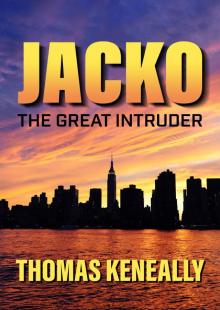 Jacko
Jacko Flying Hero Class
Flying Hero Class The Chant Of Jimmie Blacksmith
The Chant Of Jimmie Blacksmith Three Cheers For The Paraclete
Three Cheers For The Paraclete The Widow & Her Hero
The Widow & Her Hero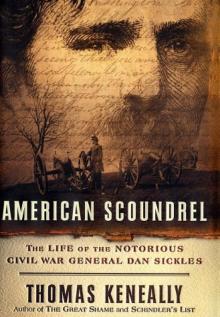 American Scoundrel
American Scoundrel The People's Train
The People's Train A Family Madness
A Family Madness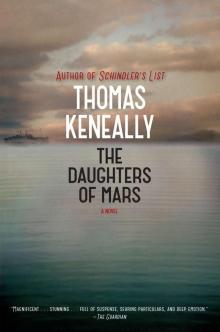 The Daughters of Mars: A Novel
The Daughters of Mars: A Novel Homebush Boy
Homebush Boy Bettany's Book
Bettany's Book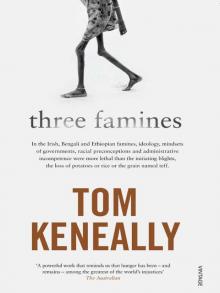 Three Famines
Three Famines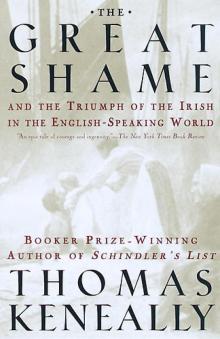 The Great Shame
The Great Shame